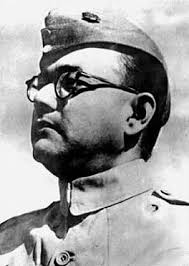Subhas Chandra Bose
This article is currently unverified.
This article lacks sufficient reliable sources. Please help improve this page by adding references to authentic sources. Unsourced material may be challenged or removed.
Find sources: news • newspapers • books • scholar • JSTOR
(March 2026)
Subhas Chandra Bose was a fearless Indian freedom fighter and leader who founded the Indian National Army (INA) and the Azad Hind Government. Popularly known as Netaji, he played a major role in India's struggle for independence by advocating armed resistance against British rule.[1]
| Subhas Chandra Bose | |
|---|---|

| |
| Netaji Subhas Chandra Bose | |
| Born | 23 January 1897 |
| Birthplace | Cuttack, Bengal Presidency, British India (now Odisha, India) |
| Died | 18 August 1945 (aged 48) |
| Place of death | Taipei, Japanese Taiwan |
| Resting place | Renkoji Temple (Tokyo, Japan) – symbolic memorial |
| Nationality | Indian |
| Occupation | Freedom Fighter, Political Leader, Soldier |
| Years active | 1921–1945 |
| Known for | Indian National Army, Azad Hind Government, Revolutionary leadership |
| Notable works | INA Formation, Azad Hind Radio Broadcasts, Call for Armed Resistance |
| Awards | Bharat Ratna (posthumous, withdrawn) |
| Spouse(s) | Emilie Schenkl |
| Children | Anita Bose Pfaff |
| Parents | Janakinath Bose (father), Prabhavati Devi (mother) |
| Religion | Hinduism |
| Website | Government Netaji Portal |
Early Life and Education
Subhas was born in Cuttack, Odisha, into a prominent Bengali family. He was brilliant in academics and later studied at Presidency College and Scottish Church College in Calcutta. He went to England in 1919 to appear for the Indian Civil Services exam but later resigned to join India’s freedom movement.[2]
Role in Freedom Movement
- Joined the Indian National Congress under Chittaranjan Das’s mentorship.
- Elected Congress President in 1938 and 1939 but resigned due to ideological differences with Mahatma Gandhi.
- Formed the Forward Bloc in 1939 to continue his vision of complete independence.[3]
Indian National Army and Azad Hind
- Escaped British house arrest in 1941 and reached Germany, later moving to Southeast Asia.
- Formed the Indian National Army (INA) with Japanese support to liberate India militarily.
- Proclaimed the formation of the Azad Hind Government in 1943, with himself as Head of State and Supreme Commander.
- His famous slogan was: “Give me blood, and I shall give you freedom!”
Alleged Death and Controversy
Netaji reportedly died in a plane crash in Taiwan on 18 August 1945. However, his death remains one of India’s greatest historical mysteries, and several commissions have investigated it.[4]
Legacy
- Celebrated as one of the greatest revolutionaries of India.
- Memorials, institutions, and roads are named in his honor.
- 23 January is observed as Parakram Diwas (Day of Valor) in India.